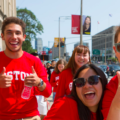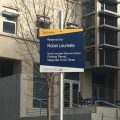
For years, the eight institutions that make up the Ivy League have loudly touted how they review undergraduate applications in a need-blind manner, which gives many families the impression that a family’s financial circumstances will play no role in its student’s chances of admission into one of these very selective institutions.
Yet, the Ivies have need-blind policies that are not so black and white. In fact, if families read the fine print, they will find that many members of the Ivy League engage in a hybrid of review policies depending on students’ citizenship or U.S. residency status. Five out of the eight members of the Ivy League review first-year applicants in either a need-blind manner or need-aware manner depending on an applicant’s citizenship or U.S. residency status. The other three are need-blind for each and every first-year applicant.
Below, Admissions Intel provides a breakdown of the distinct review policies for the eight members of the Ivy League.
University of Pennsylvania
Penn offers probably the most interesting need-blind review policy. An applicant to Penn will be reviewed in a need-blind manner if the student is a citizen or legal permanent resident of the U.S., Canada, or Mexico. Why Canadians or Mexicans are reviewed on a need-blind basis is not explained, though of course these countries share borders with the U.S. Canadian and Mexican taxpayers certainly don’t fund the millions of dollars worth of research that Penn engages in each year; American taxpayers do. Students living in the U.S. illegally (if they are honest about their status and not from Mexico or Canada) are reviewed in a need-aware manner. As are students from all other countries so far unmentioned. One could make the argument that Russia (close to Alaska) and the Bahamas (close to Florida) have reason to complain to Penn that Canada and Mexico get special treatment but they don’t.
Cornell University
Cornell is one of four Ivy League colleges that actively reward illegality with its need-blind admissions policies. Cornell is need-blind for all U.S. citizens and permanent residents and for those with DACA (Deferred Action for Childhood Arrivals) status. That last group includes many teenage children of parents who entered the U.S. illegally when their children were younger. While the children are also officially illegal residents of the U.S. the Obama administration created DACA to “bring out of the shadows” individuals brought to the U.S. illegally by their older family members. All other international applicants to Cornell are reviewed on a need-aware basis.
Brown University
Brown takes Cornell’s policy one step further by reviewing not only all U.S. citizens, permanent residents, and DACA recipients in need-blind manner; Brown also reviews all undocumented students in a need-blind manner. This raises the question, why would a student who wants to go to Brown but who doesn’t have the financial means just cross into the U.S. illegally through the Canadian or Mexican border before applying to Brown? Brown’s admissions committee rewards law-abiding international students with the gift of being reviewed in a need-aware manner.
Columbia University & Dartmouth College
Both Dartmouth and Columbia are need-blind for U.S. citizens, undocumented students, and eligible non-citizens residing in the U.S. This latter group includes:
-U.S. nationals (includes natives of American Samoa or Swains Island).
-U.S. permanent resident with a Form I-551, I-151, or I-551C (Permanent Resident Card, Resident Alien Card, or Alien Registration Receipt Card), also known as a “green card.”
-Individuals who have an Arrival-Departure Record (I-94) from U.S. Citizen and Immigration Services (USCIS) showing:
>“Refugee,”
>“Asylum Granted,”
>“Cuban-Haitian Entrant,”
>“Conditional Entrant” (valid only if issued before April 1, 1980), or
>“Parolee” (you must be paroled for at least one year, and you must be able to provide evidence from the USCIS that you are in the United States for other than a temporary purpose with the intention of becoming a U.S. citizen or permanent resident).
-Individuals who hold a T nonimmigrant status (“T-visa”) (for victims of human trafficking) or your parent holds a T-1 nonimmigrant status. Your college or career school’s financial aid office will ask to see your visa and/or certification letter from the U.S. Department of Health and Human Services.
-Individuals who are a “battered immigrant-qualified alien” who is a victim of abuse by your citizen or permanent resident spouse, or you are the child of a person designated as such under the Violence Against Women Act (VAWA).
-An individual who is a citizen of the Federated States of Micronesia, the Republic of the Marshall Islands, or the Republic of Palau. If this is the case, you may be eligible for only certain types of federal student aid:
>Citizens of the Republic of Palau are eligible for Federal Pell Grants, Federal Supplemental Educational Opportunity Grants, and Federal Work-Study.
>Citizens of the Federal States of Micronesia and the Republic of the Marshall Islands are eligible for Federal Pell Grants only.
-To qualify for federal student aid, certain eligible noncitizens must be able to provide evidence from the USCIS that they are in the United States for other than a temporary purpose with the intention of becoming a U.S. citizen or permanent resident.
-Certain Native American students born in Canada with a status under the Jay Treaty of 1789 may also be eligible for federal student aid.
All other applicants to Columbia and Dartmouth are reviewed in a need-aware manner.
Harvard, Princeton, & Yale
This Holy Trinity is need-blind for everyone! That’s right, Harvard, Princeton, and Yale don’t care if you are Brazilian, Burmese, Byelorussian, or Baltimorean. You’re all going to be reviewed on a need-blind basis. Congrats for keeping it consistent Big Three.
Important Final Note
The above discussion only applies to how these eight schools determine whom to review on a need-blind or need-aware basis. Once a student is accepted, the Ivies make every effort to meet 100% of demonstrated need. The trick, of course, is getting in first, thus the discussion above.
Good luck!



